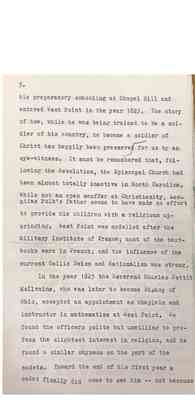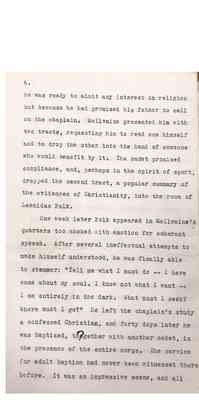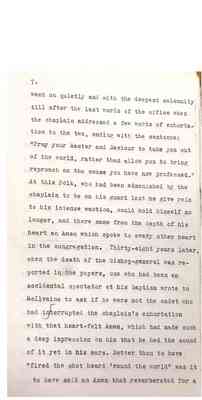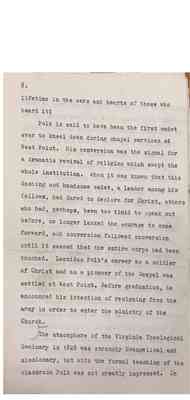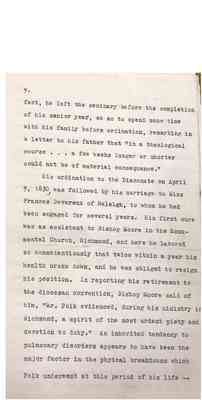Pages
6
-5-
his preparatory schooling at Chapel Hill and entered West Point in the year 1823. The story of how, while he was being trained to be a soldier of his country, he became a soldier of Christ has happily been preserved for us by an eye-witness. It must be remembered that, following the Revolution, the Episcopal Church had been almost totally inactive in North Carolina. While not an open scoffer at Christianity, Leonidas Polk's father seems to have made no effort to provide his children with a religious upbringing. West Point was modelled after the Military Institute of France; most of the textbooks were in French; and the influence of the current Gallic Deism and Rationalism was strong.
In the year 1825 the [Reverend Charles Pettit McIlvaine]], who was later to become Bishop of Ohio, accepted an appointment as chaplain and instructor in mathematics at West Point. He found the officers polite but unwilling to profess the slightest interest in religion, and he found a similar shyness on the part of the cadets. Toward the end of his first year a cadet finally did come to see him -- not because
7
-6-
he was ready to admit any interest in religion but because he had promised his father to call on the chaplain. McIlvaine presented him with two tracts, requesting him to read one himself and to drop the other into the hand of someone who would benefit by it. The cadet promised compliance, and, perhaps in the spirit of sport, dropped the second tract, and popular summary of the evidences of Christianity, into the room of Leonidas Polk.
One week later Polk appeared in McIlvaine's quarters too choked with emotion for coherent speech. After several ineffectual attempts to make himself understood, he was finally able to stammer: "Tell me what I must do -- I have come about my soul. I know not what I want -- I am entirely in the dark. What must I seek? Where must I go?" He left the chaplain's study a confessed Christian, and forty days later he was baptized, together with another cadet, in the presence of the entire corps. The service for adult baptism had never been witnessed there before. It was an impressive scene, and all
8
-7-
went on quietly and with the deepest solemnity till after the last words of the office when the chaplain addressed a few words of exhortation to the two, ending with the sentence: "Pray your Master and Saviour to take you out of the world, rather than allow you to bring reproach on the cause you have now professed." At this Polk, who had been admonished by the chaplain to be on his guard lest he give rein to his intense emotion, could hold himself no longer, and there came from the depth of his heart an Amen which spoke to every other heart in the congregation. Thirty-eight years later, when the death of the bishop-general was reported in the papers, one who had been an accidentl spectator at his baptism wrote to McIlvaine to ask if he were not the cadet who had interrupted the chaplain's exhortation with that heart-felt Amen, which had made such a deep impression on him that he had the sound of it yet in his ears. Better than to have "fired the shot heard around the world" was it to have said an Amen that reverberated for a
9
-8-
lifetime in the ears and hearts of those who heart it!
Polk is said to have been the first cadet ever to kneel down during chapel services at West Point. His conversation was the signal for a dramatic revival of religion which swept the whole institution. When it was known that this dashing and handsome cadet, a leader among his fellows, had dared to declare for Christ, others who had, perhaps, been too timid to speak out before, no longer lacked the courage to come forward, and conversion followed conversion until it seemed that the entire corps had been touched. Leonidas Polk's career as a soldier of Christ and as a pioneer of the Gospel was settled at West Point. Before graduation, he announced hhis intention of resigning from the army in order to enter the ministry of the Church.
The atmosphere of the Virginia Theological Seminary in 1828 was strongly Evangelical and missionary, but with the formal teaching of the classroom Polk was not greatly impressed. In
10
-9-
fact, he left the seminary before the completion of his senior year, so as to spend some time with his family before ordination, remarking in a letter to his father that "in a theological course ... a few weeks longer or shorter could not be of material consequence."
His ordination to the Disconate on April 9, 1830, was followed by his marriage to Miss Frances Devereux of Raleigh, to whom he had been engaged for several years. His first cure was as assistant to Bishop Moore in the Monumental Church, Richmond, and here he labored so conscientiously that twice within a year his health broke down, and he was obliged to resign his position. In reporting his retirement to the diocesan convention, Bishop Moore said of him, "Mr. Polk evidenced, during his ministry in Richmond, a spirit of the most ardent piety and devotion to duty." An inherited tendency to pulmonary disorders appears to have been the major factor in the physical breakdowns which Polk underwent at this period of his life --
